By Renée Santos
Los Angeles, CA (The Hollywood Times) 1/9/24 – I rolled up to my old stomping ground in Massachusetts with the pleasure to review the world premiere, of Real Women Have Curves: The Musical at The American Repertory Theater in Cambridge. I was bubbling from the moment I got the assignment. Seated up front and center for the next rendition of a story that was the groundbreaking rally cry favorite of the Sundance Film Festival in 2002, putting a Latina in the leading role for the first time.
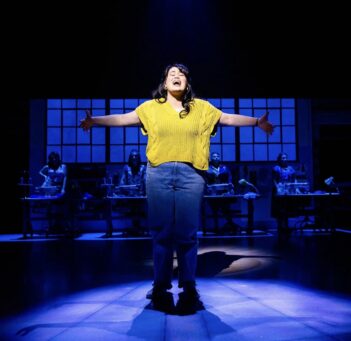
The protagonist is a first-generation Latina journalist and here I was, notebook in hand, wearing the very same hat, taking my place in the press seats as the reporter assigned to cover the story. I was in my wheelhouse. This time, Real Women Have Curves was back with songs and a lot of buzz for a potential Broadway run three decades since the first inception of the story hit the world.
Real Women Have Curves: The Musical is a powerful adaptation that celebrates diversity and body positivity. It beautifully captures the essence of the origin of this chronicle from the play written by Josefina López in 1998 to the movie reworking starring America Ferrara who gave this narrative a platform.
It showcases the complexities of womanhood, family dynamics, and nuanced societal pressures of being a Latinx immigrant in the American allegory. It’s poignant storytelling and lively musical numbers, offer an engaging and heartfelt experience, resonating with audiences through its relatable yet groundbreaking themes utilizing vibrant characters to captivate the audience into a memoir that could be so many of our own.
The melodic rendition offers a refreshing portrayal of women, particularly Latina women, in a nuanced and authentic manner, honoring the creator’s original vision, by delving into issues surrounding body image, cultural identity, and female empowerment.
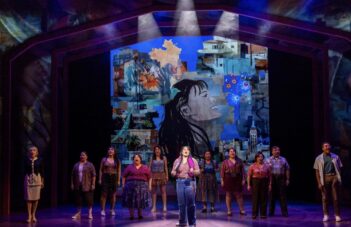
Stereotypes are shattered by the assemblage of Latina heroines highlighting the contrasting experiences and bodies of the women around her. Josefina’s statement remains the foundation while incorporating the musing of newer collaborators, drawing this adventure to life even further.
Bringing on board a stunningly talented cast, including Lucy Godínez as the leading role of Ana, Satya Chávez (Izel), Sandra Valls (Prima Fulvia), Carla Jimenez (Pancha), Shelby Acosta (Prima Flaca), Jennifer Sánchez (Rosalí), Florencia Cuenca (Estella), Yvette González-Nacer (Mrs. Wright), Justina Machado (Carmen) and a company of ensemble players that don’t miss the mark.
The creative team was nothing shy of genius including director and choreographer Tony Award winner Sergio Trujillo (Arrabal, Jersey Boys). This world-premiere musical features a book by award-winning playwright Lisa Loomer (Roe, The Waiting Room, Girl: Interrupted), with an original score by Grammy-winning recording artist Joy Huerta and co-composer and lyricist, Benjamin Valez. There was no doubt in my mind, I was about to see something extraordinary.
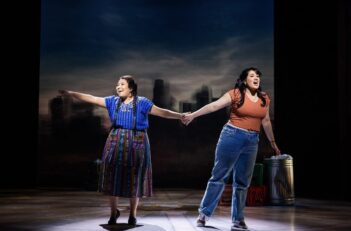
It tackles these themes with humor, sensitivity, and realism, making it relatable to audiences from a manifold of backgrounds. Its focus on the complexities of family relationships and the struggles faced by immigrant families adds depth and authenticity to the parable, making it a significant piece in exploring intersectional feminist perspectives on stage.
This story commits to correcting the sugarcoated, archetypal folktale about social mobility and the American Dream. It gives Latinx people the ability to reclaim the parts of ourselves we sacrificed to survive. Real Women Have Curves: The Musical identifies the emotional scar tissue of being the first in your lineage and seamlessly squashes any discouragement, displaying how breaking this border is essential. We can’t heal from that which we can’t name.
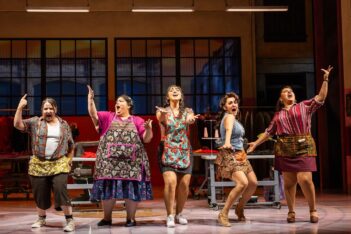
A story like this hitting a national Broadway stage represents the hope to ensure that we and the women behind are setting up for a life of success without emotional isolation. We can and must hold space for all of our stories, and to do that we cannot be a supporting character we must be the protagonist and López nailed that vision that’s holding the space for us all.
Perhaps the biggest and most rewarding surprise I found on this stage was the intersectionality of queerness within the vibrant tapestry of the Latina archive. The inclusion of a queer character allowed for the exploration of nuanced themes such as identity within the Latina community, family dynamics, societal expectations, and resilience.
Although this character still played a supporting role, this Musical invites a critical conversation about acceptance, tolerance, and the celebration of diversity. It represents a pivotal aspect of representation and empowerment. Embracing and acknowledging the queer presence within Latina stories contributes profoundly to both social and cultural landscapes.
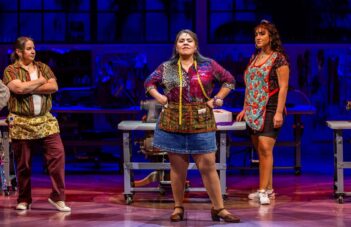
Valls’ character is the only queer character in the sewing shop. In a brief button of dialogue, Prima comments on the shop expansion to incorporate her attire, “…something more… my style…” coming out in the last ensemble number with a pantsuit representing the Lesbian flag.
Latinx communities, steeped in rich cultural heritage, embody a diverse spectrum of identities and experiences. However, historical accounts often sidelined or silenced the voices and stories of queer individuals within these communities. Integrating a queer presence within Real Women Have Curves: The Musical is an assertion of visibility and recognition, offering a more comprehensive and authentic portrayal of the multifaceted Latinx identity.
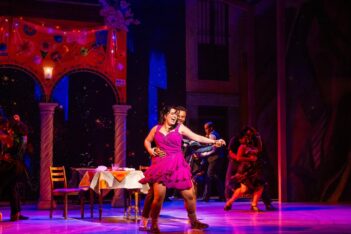
Real Women Have Curves: The Musical runs in Cambridge through January 21, with rumors to continue to showcase regionally throughout the U.S. in the coming year. This show deserves a Broadway run, with this original cast to carry the baton. For 30 years Josefina López’s vision has been wowing audiences and the road should not stop here.
Here is a YouTube video entitled “Audience LOVE Real Women Have Curves: The Musical”
This story shows the personified single-minded tenacity and blind faith in the American dream. The specific borders Latin women breach is different, but what unites us is a shared familiarity with a particular set of experiences, challenges, and expectations that come with the territory. It is a beautiful thing to see a story where the youngest woman in a family, disrupts the deep-rooted generational patterns to become our ancestors’ wildest dreams.
This show isn’t about crossing a disadvantaged, marginalizing bridge. Real Women Have Curves: The Musical is the bridge, painstakingly stretched from where we come from to where we hope to arrive. This musical will ignite a long overdue conversation and the Broadway stage is the perfect place to spark a flame for every audience to join in the discussion.
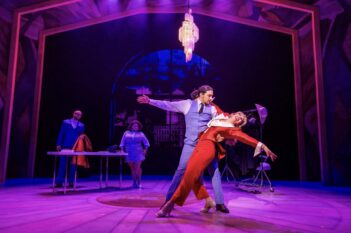
Beating the odds is hard enough. We live in a time of rising income inequality and declining social mobility. There is only a 7.5 percent probability that a child born to parents in the bottom fifth of the income distribution will reach the top fifth. Pain and poverty travel through generations of the Latinx population but owning one’s entire journey can be a radical act of healing.
Real Women Have Curves: The Musical commits to correcting the sugarcoated history of advancement and the American Dream. This show accomplishes the collapse of the auxiliary Latina story with levity and music revealing the wounds of women of all ethnicities, shapes, and sizes, giving light to one another, and inadvertent permission to be a little freer and a little less alone. It reclaims the part of the Latinx story so many sacrificed in order to survive.




